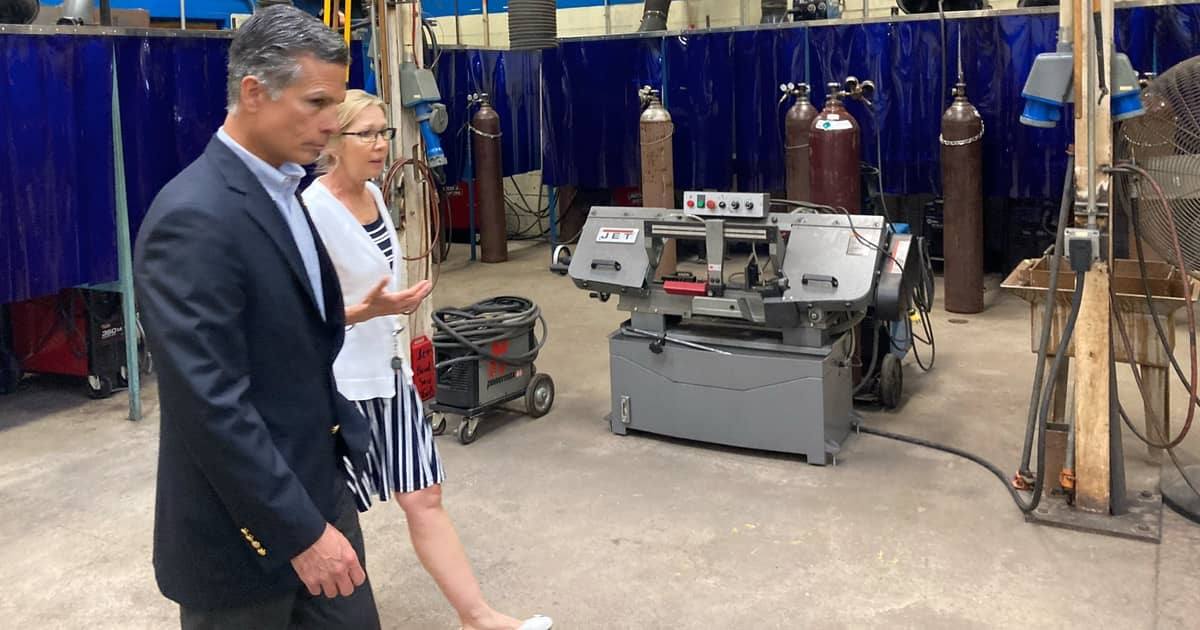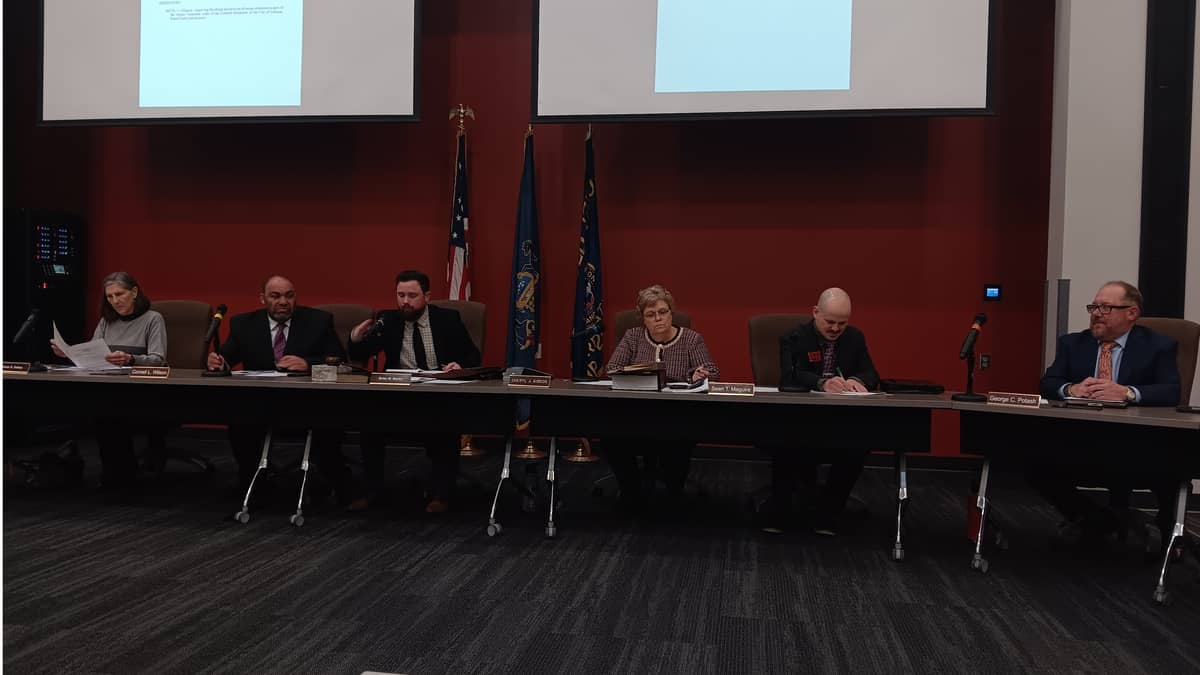Many businesses in Lebanon County have faced the same problem for many years: not enough skilled workers to fulfill the jobs they have.
That dilemma is being exacerbated by another set of issues that prevents the Lebanon County Career and Technology Center from fulfilling its mission.
“To me, because I’ve been here 15 years, (the biggest concerns are) space and funding –with staffing coming between those two,” said Kelly Flowers, LCCTC counselor and co-op coordinator, during a press tour Monday, June 26, with U.S. Rep. Dan Meuser (R-PA9), whose district includes Lebanon County.
The lack of adequate space needed to train all the students who apply to attend LCCTC was a fact heard again and again throughout the 90-minute tour, which included a visit to about half of the 22 departmental programs offered at LCCTC.
LCCTC’s mission is to provide high school students from all six county-based school districts and adults “the skills, knowledge and understanding to obtain employment, advance their careers, pursue secondary education and enrich their lives.”
A fourth issue, according to Andra Groller, LCCTC’s acting director, is having enough funding to purchase, and also repair, the equipment needed to properly train the students. (Groller will officially become the center’s director on July 1.)

“As I said before, our equipment budget for the entire year is only $250,000, that’s it,” said Groller. “So when you look at a program like electromechanical or look at a program like precision machining, it’s very expensive.”
Read More: LCCTC students manufacture parts for NASA, send signatures to space
Given the multi-faceted nature of the problem, Meuser said during an informal discussion with the school administrators and press after the tour that solving these problems will benefit the community.
“The ultimate goal is properly meeting the demand and then how do you do that? Expansion, staffing, equipment,” said Meuser. “And the thing is that we have all of these workforce issues, and I also think that a majority of those who go through here – for whatever reason, I don’t know, it’s just intuitive, might want to stay here.”
Flowers said a majority of the 300 graduating seniors do remain in Lebanon County to work after graduation.
“Of our graduating class, 60 percent of them go out into the workforce in this surrounding area,” said Flowers. “About 30 percent go post-secondary and 10 percent, military.”
The space/staff/funding conundrum is expected to worsen in the near term. The number of students who graduate from LCCTC is set to increase in the 2023-24 school year, according to Flowers, who said that the Class of 2024 will graduate 400 seniors – 100 more than this spring.
Flowers said the increased enrollment at LCCTC, as well as at all six schools in Lebanon County, is proof that the county’s population is on the rise. That means solutions are needed to address the educational needs of the growing collective student body.
“We had asked our six high schools what their projected classes are for the next five years and their classes are growing,” said Flowers. “And if we don’t grow, we’re not being fair to all of those students.”
Officials said that this situation is detrimental to the current and future workforce needs of Lebanon County employers, especially given how many students are currently being denied enrollment. (For example, it was noted during the tour that Lebanon County has over 50 machine shops whose owners have continuous workforce needs.)
For the 2023-24 school year, LCCTC refused to admit 150 applicants, with 87 of those denials coming in the automotive, cosmetology and welding programs.
To demonstrate the spacing issue, the tour visited a tiny, box-shaped classroom in the welding department that is capable of seating only 18 students.
“If we had more space and another instructor, we could probably fill three additional classrooms with the amount of applications we get,” Flowers told LebTown during the tour. “I’d say we get between 50 and 60 applications within any given year.”
But what happens to all of the students who wish to attend LCCTC to learn a trade but are denied the opportunity due to a lack of space and instructors?
“Well, that’s one study that I would like to do,” said Groller, who had previously told Meuser that a number of their students already work outside of the classroom environment to financially support their families. “Are they staying in school? … You know, if they can’t go through with their career. Where are they? Are they going back to the same district as a full-day student? Are they going somewhere else? We don’t want to turn anyone away, we just don’t have the room.”

Alex DiMarzio, LCCTC principal, said the problem is not unique to Lebanon County, noting that the same issues exist in Berks, Dauphin and York counties.
“It’s disheartening for all of us because we want to get all students in here, every applicant, and not turn away anyone,” said DiMarzio.
Meuser, who said at the start of the tour that he was happy to be back in the legislative district after eight consecutive weeks in the nation’s capital, came to the Lebanon Valley for a tour of the facility and to learn how his office can be a resource as administrators confront the dilemma.

During remarks to the press, Meuser said there are multiple potential funding sources that LCCTC may be able to access.
“Department of Education, Department of Labor, some of the discretionary funding we receive,” said Meuser when LebTown asked about funding sources. “It’s called Community Project funding. That comes from a round-up basis, and that is based upon funding that will deliver the most return of that investment in a community.”
That funding, he added, has a ripple effect throughout the community. How much funding would be designated for LCCTC or when it would be available is unknown at this time.
“The investments we make here will have significant ripple effects for small business, for fulfilling the lack of workforce and allow businesses to grow in our community,” said Meuser.
One factor that benefits LCCTC is that has room to expand at its current location. School officials said they own about 25 undeveloped acres and the county has another eight acres that could be available to the district.
Read More: Land developer connected to Sheetz finalizes years-in-the-making purchase of county lot next to DMV
“I’ve told Alex that the county has eight acres and that when he’s ready to talk to give us a call,” said Lebanon County Commissioner Robert Phillips, who attended the press tour along with fellow commissioner Mike Kuhn.
Questions about this story? Suggestions for a future LebTown article? Reach our newsroom using this contact form and we’ll do our best to get back to you.

Become a LebTown member.
Cancel anytime.
Monthly Subscription
🌟 Annual Subscription
- Still no paywall!
- Fewer ads
- Exclusive events and emails
- All monthly benefits
- Most popular option
- Make a bigger impact
Already a member? Log in here to hide these messages
Free local news isn’t cheap. If you value the coverage LebTown provides, help us make it sustainable. You can unlock more reporting for the community by joining as a monthly or annual member, or supporting our work with a one-time contribution. Cancel anytime.

























